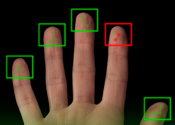Legislation Affecting the Federal DNA Database Unit
Legislation affecting the Federal DNA Database Unit
Legislation Affecting the Federal DNA Database Unit
DNA Identification Act of 1994
- Approved date August 25, 1994; effective date September 13, 1994
- This legislation authorized and allowed the FBI to establish the Combined DNA Index System (CODIS) and maintain the National DNA Index System (NDIS).
- The indexes of CODIS were defined as such:
- Convicted Offender (Legal)
- Missing Persons
- Relatives of Missing Persons
- Unidentified Human (Remains)
- Forensic Unknown
- Population Database (if personal identifying information is removed)
- The legislation required individuals generating DNA profiles to be proficiency tested every 180 days.
- The legislation mandated that quality assurance standards be released by the Director of the FBI, with recommendations made by a panel called the DNA Advisory Board. Laboratories wishing to participate in the NDIS need to be audited externally every two years against these standards.
DNA Backlog Elimination Act of 2000
- Amended the DNA Identification Act of 1994
- Approved date December 19, 2000; effective date June 28, 2001
- This legislation created the Federal Convicted Offender (FCO) Program, which later became the Federal DNA Database Unit (FDDU). This program (and later unit) was established to produce the DNA profiles from federal and District of Columbia convicted offenders, as well as individuals on federal probation, to be uploaded to the NDIS.
- This legislation gave the initial list of qualifying offenses for collection of individuals who were convicted of the following crimes: murder, homicide, voluntary manslaughter, sexual abuse or exploitation, peonage and slavery, kidnapping, robbery or burglary, crimes in Indian country, etc.
- This amended the DNA Identification Act of 1994 that required laboratories to have an expungement policy and procedures for individuals who had their conviction overturned.
U.S.A. Patriot Act of 2001
- Amended DNA Backlog Elimination Act of 2000
- Approved October 26, 2001; effective date December 29, 2003
- This legislation expanded the list of federal qualifying offenses itemized in the DNA Backlog Elimination Act of 2000 to include federal crimes of terrorism and any crime of violence, as well as any attempt or conspiracy to commit a crime of terrorism of violence.
Justice for All Act 2004
- Amended the DNA Backlog Elimination Act of 2000
- Approved date October 30, 2004; effective date January 31, 2005
- This legislation required that laboratories participating in NDIS be accredited. The NDIS Board defined that accreditation must be satisfied by either the American Society of Crime Laboratory Directors/Laboratory Accreditation Board (ASCLD/LAB) or Forensic Quality Services (FQS).
- This expanded the list of federal qualifying offenses itemized in the U.S.A. Patriot Act of 2001 to include any federal felony conviction.
DNA Fingerprint Act of 2005
- Amended the DNA Backlog Elimination Act of 2000
- Approved date January 5, 2006; effective date January 9, 2009
- This legislation expanded the list of federal qualifying offenses to individuals who are arrested or from non-U.S. persons who are detained under the authority of the United States.
- This amended the DNA Identification Act of 1994 to require laboratories to have an expungement policy and procedures for individuals who had their charges dropped, not filed, or were acquitted of charges.
Adam Walsh Child Protection and Safety Act of 2006
- Amended DNA Fingerprint Act of 2005
- Approved date July 27, 2006; effective date January 9, 2009
- This legislation amended the language of previous legislation to include “individuals who are arrested, facing charges, or convicted and from non-United States persons who are detained under the authority of the United States.”
- The National Sex Offender Registry was setup and required individuals who registered as sex offenders to submit samples, even retroactively.
- The FBI is responsible for collection of sex offenders from Indian countries and United States territories.
District of Columbia Law 14-52 (DC Code 22-4151)
- Effective date November 10, 2001
- This legislation was the initial list of qualifying District of Columbia offenses for convicted offenders.
District of Columbia Law 18-88 (DC Code 22-4151)
- Effective date December 10, 2009
- This legislation amended DC Code 22-4151, Law 14-52, to expand the list of qualifying District of Columbia offenses to include all felons and all misdemeanor sex offenders.
08.16.10



